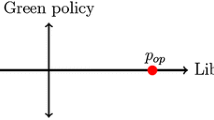Abstract
Game-theoretic models of political decision-making regard policy outcomes as a combined result of actor preferences and institutions. This paper explores the effects of adding relative issue salience to the analysis. I focus on non-cooperative models of complete and perfect information that are based on the concept of structure-induced equilibrium (Shepsle in Am J Polit Sci 23(1):27–59, 1979). Assuming a progressive agenda-setter and two conservative voters, I show how a change of the relative issue salience for players in a game results in a different equilibrium outcome in a political decision-making body.







Similar content being viewed by others
References
Buchanan, J., & Tullock, G. (1962). The calculus of consent. Ann Arbor: University of Michigan Press.
Coleman, J. (1972). Systems of social exchange. Journal of Mathematical Sociology, 2, 145–163.
Kadane, J. B. (1972). On division of the question. Public Choice,13, 47–54.
Kramer, G. (1972). Sophisticated voting over multidimensional choice spaces. Journal of Mathematical Sociology, 2, 165–180.
Kreps, D. (1990). A course in microeconomic theory. Princeton: Princeton University Press.
Riker, W. (1982). Liberalism against populism: a confrontation between the theory of democracy and the theory of social choice. San Francisco: Freeman.
Riker, W. (1986). The art of political manipulation. New Haven: Yale University Press.
Shepsle, K. (1979). Institutional arrangements and equilibrium in multidimensional voting models. American Journal of Political Science, 23(1), 27–59.
Tsebelis, G. (2002). Veto players: how political institutions work. Princeton: Princeton University Press.
Acknowledgement
I would like to thank Bernard Steunenberg and Robert Thomson for useful comments. Financial support from the Netherlands Organisation for Scientific Research (NWO) is gratefully acknowledged.
Author information
Authors and Affiliations
Corresponding author
Rights and permissions
About this article
Cite this article
Selck, T.J. The Effects of Issue Salience on Political Decision-making. Constit Polit Econ 17, 5–13 (2006). https://doi.org/10.1007/s10602-006-6790-1
Issue Date:
DOI: https://doi.org/10.1007/s10602-006-6790-1




